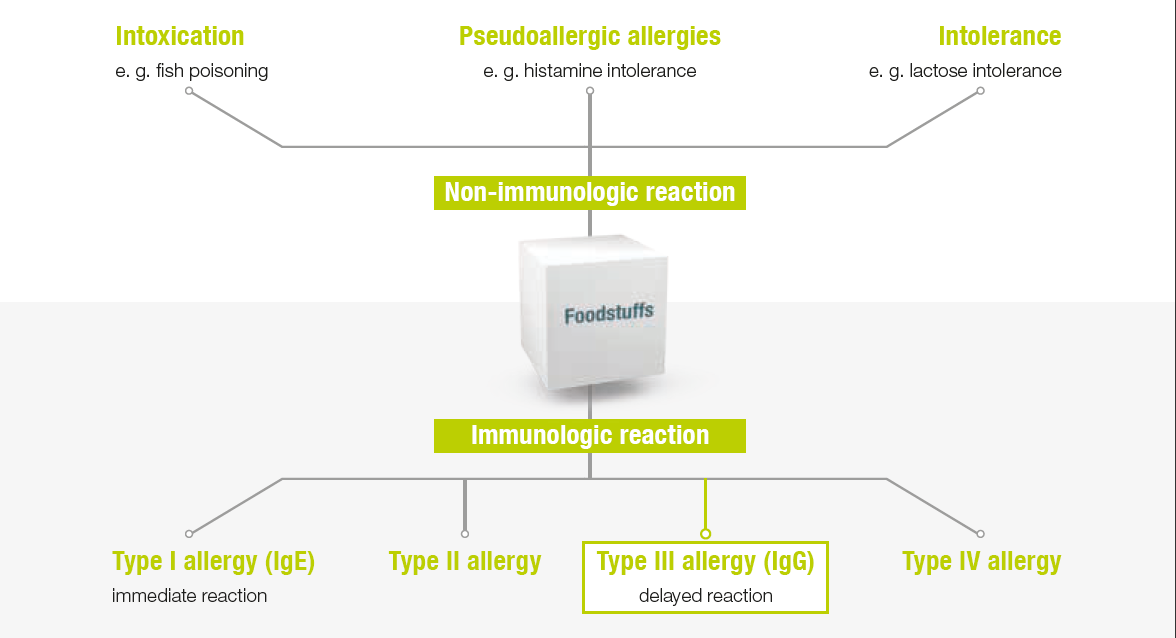IgG is one of 5 types of antibodies designed to protect us from invading bacteria, viruses etc. They do this by recognizing the protein in that pathogen and launching an inflammatory response.
The issue is when IgG antibodies are developed against food proteins like gluten, cow’s milk, egg white or any food that may be in your diet. Constant consumption of these foods then become the trigger for low-grade and often chronic inflammatory symptoms like IBS, bloating & gas, eczema, joint pain, fatigue, headache and weight gain for example. Since the reactions are delayed (not immediate as with ‘classic’ gE allergies), symptoms can take hours or up to 3 days to appear. The culprits are too hard to identify and people give up on their traditional elimination diet out of frustration.
How do we test?
ImuPro tests on blood serum only as this has the highest concentration of IgG antibodies. We do not test on hair or finger prick samples. We will provide you with a test kit to attend your local pathology for your blood draw. Results will be emailed to you within 10-14 business days. Click here for a 45 second video explainer on how to take the test.
What foods do we test?
We test for up to 270 individual foods on a single blood sample, making this the most comprehensive IgG test available worldwide. For the full list please click here.
Is the testing right for me?
Identifying the right culprits of food allergy or intolerance is not always easy. When we talk about allergies to food we think about lips swelling, instant hives etc. These are called classic IgE allergies and we usually have these for life. ImuPro specialises in delayed responses to foods triggered by low grade inflammation.
Symptoms like IBS, bloating & gas, eczema, joint pain, fatigue, headache and weight gain etc can often be caused by having a monotonous diet but knowing exactly how to pinpoint those foods is almost impossible without testing.
Symptoms can occur up to 3 days after eating a trigger food, so it’s not always a matter of blaming the last meal!
The value of IgG tests has come under some criticism in medical circles. However it is important to note that most of the controversy surrounding IgG testing relates to IgG4 testing, which ImuPro do not recommend for food intolerance testing either. ImuPro tests IgG in all its subclasses (IgG 1, 2, 3 and 4). IgG4 is not pro-inflammatory and is therefore not really relevant to IgG mediated food intolerances.
Critics of IgG tests argue against them on two main points:
False Positive results
Not all foods tested positively actually cause the symptoms, so critics claims that IgG tests deliver ‘false positive’ results.
This argument, though, falls down under scrutiny.
For a start, just because there is no visible symptom doesn’t mean it’s not there. If the body is creating IgG antibodies to fight a certain food you have eaten, inflammation will be caused. This inflammation may be inside the body, and therefore not visible.
Second, ImuPro doesn’t claim to show a connection between a food and a certain symptom. What it does is detect the IgG antibodies that are produced by your immune system to fight against certain foods. In other words, it is the first step to identify those foods which cause your delayed food allergies.
Only by eliminating these foods from your diet for a period of time will inflammation abate and your body recover. Once this process has taken place, the eliminated foods are then reintroduced in a measured fashion, one at a time. In this way, specific foods that cause problems are easily identified by monitoring for the return of symptoms. (This strategy is also used in IgE testing to mediate classic food allergies.)
Malnutrition
Critics also claim that IgG tests lead to malnutrition. Again, this criticism cannot be leveled at ImuPro, because the process of food allergy identification by ImuPro requires food rotation and reintroduction.
Once potential trigger foods have been identified by the ImuPro test, an individual diet plan is designed that removes these foods from your diet. Remaining allowable foods are rotated on a 4/ 5 day basis. In this way, your diet remains varied, and nutrition is maintained. Your body receives all the nutrients it needs.
It takes three months for the immune system to stabilise, and it is at this time you’ll be able to reintroduce foods one by one. Your diet is guaranteed to be diversified and balanced throughout this process.
In summary, the criticism of IgG tests is not relevant to ImuPro. If you suffer from inflammatory conditions such as diarrhea, flatulence, migraine, excess weight, joint pain, tiredness, or skin problems, then discovering possible trigger foods is the first step to their elimination.
The ImuPro test helps guide you to the foods that cause your problems, first by identifying abundance of IgG antibodies, and then with a structured diet plan that eliminates and reintroduces possible problem foods in a structured way. This helps you to identify the foods you need to avoid, if any.
